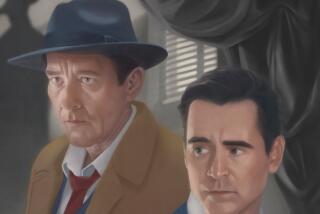Movie Reviews : FROM THE BAYOUS TO THE CATSKILLS : ‘Big Easy’--Good and Evil Among Magnolias and Southern Accents
- Share via
There’s a purring, laid-back quality to Dennis Quaid’s police lieutenant, Remy McSwain, in “The Big Easy” (selected theaters) that is ease itself. This is a man who takes charge with a deprecating, triangular grin that flusters women and slides right over New Orleans’ wise guys.
That he takes bribes as well goes hand in hand with his city’s traditions, where corruption is rooted as deeply as the magnolia trees--”Jus’ the way things are done down here.”
To Eastern-born Assistant District Attorney Anne Osborne (Ellen Barkin), who is investigating police corruption in the city, those magnolias don’t smell quite so sweet; they have what Tennessee Williams once called an odor of mendacity.
And so screenwriter Daniel Petrie Jr. sets up the conflict, and director Jim McBride fleshes it out with devastating, sexy assurance: With a bloody gangland drug war as backdrop, they pit the straight and narrow against the big easy.
If it were only that simple--but one of the film’s many strong qualities is to show how easily the lines get blurred. McSwain is the son of a cop who was on the take all his life. Part of McSwain’s kickback from the purported Widows and Orphans Fund, routinely slipped onto his desk, pays his brother’s (Tom O’Brien) college costs. Another part cushions his handsome, widowed mother’s (Grace Zabriskie) existence, at least until she marries McSwain’s superior officer (Ned Beatty). And from the look of it, a considerable part contributes to McSwain’s own personal flash. Nobody is living extravagantly, only living a little better. “A good life for doing a dirty job.” Where’s the harm?
Everywhere. The film makers suggest there’s no such thing as a little harmless corruption. Our outrage should be evenhanded, whether it’s directed at a sour Mafia kingpin (that great icon Marc Lawrence) or the expansive Beatty or, by extension, anyone in political life.
The crusading angel and the devilish wrongdoer are hardly new figures on the American screen. Director McBride’s method of shaking things up a little, the thwack between the eyes that guarantees our attention, is the electric charge of attraction between the silkily experienced cop and the definitively cautious lawyer, a lady who outlines her conversations on a yellow legal pad before she picks up a phone.
(Authoritative, knee-weakening sexuality is definitely one of McBride’s trademarks; it’s a safe bet that more people remember the Richard Gere-Valerie Kaprisky encounters in McBride’s “Breathless” than its updated Angst .)
There’s something authoritative, too, to the feeling of the city that goes beyond familiar iron filigree and a lilt in the voice. There’s its sound, by musicians like the Neville Brothers and Prof. Longhair, zydeco by Beausoleil. And Affonso Beato’s camera captures the city at its most affecting, with its enormous accessibility to life; at impromptu front-yard barbecues where everybody dances, kids to grandparents, and where McSwain even plays guitar and sings. Seldom has corruption had such a folksy face.
Eventually the film’s suspense underpinnings take over its personal story, yet that tension Quaid and Barkin generate still holds. Soldily fine as actors they’re also a great pair, like two golden athletes. Quaid is freer, even more humorous than his lovely work in “Innerspace”--and with more room to do it in. And with her wonderful full mouth and blessedly untampered-with nose, there’s no sense of prissiness to Barkin’s voice of conscience. It may be years before this scene of lovemaking fades from memory either. (That, and language, are the reasons for the film’s R rating.)
McBride has also cast to the fullest, eccentric advantage. This marks the last screen performance of the late Charles Ludlam, that great parodist and man of the theater, as McSwain’s eccentric lawyer. As another cop, Lisa Jane Persky is so good you wish her character came to something more. And Beatty (and increasingly, Grace Zabriskie as McSwain’s mother) is incapable of a bad performance.
More to Read
Only good movies
Get the Indie Focus newsletter, Mark Olsen's weekly guide to the world of cinema.
You may occasionally receive promotional content from the Los Angeles Times.










